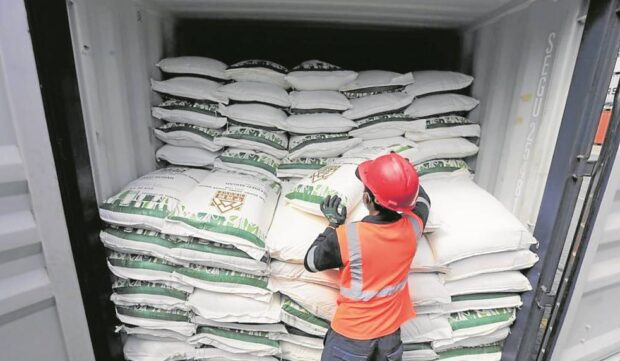
A port worker examines a shipment of sugar. (File photo from the Facebook page of the Bureau of Customs)
MANILA, Philippines — A group of sugarcane planters has called on the Sugar Regulatory Administration (SRA) to make an inventory of the country’s sugar stockpile, including the entry of 440,000 metric tons (MT) of imported sugar under the last importation order allowed by the agency.
In a statement, National Federation of Sugarcane Planters Inc. president Enrique Rojas said the inventory should be done before the SRA even decides whether or not there is a need to import more of the commodity.
On Monday, Malacañang announced that President Ferdinand Marcos Jr. had approved the additional importation of 150,000 MT of sugar following the SRA’s recommendation to stabilize prices and boost the country’s stock.
“If there is indeed a shortfall even with the latest approved importation, then we should import only the exact amount of the shortfall for this crop year,” Rojas pointed out.
He added that the next batch of imported sugar should enter the Philippines before the next cropping season so it would not affect retail prices.
As of Wednesday, refined sugar is sold from P86 to P110 a kilo from only P70 in the previous year, based on the price monitoring of the Department of Agriculture (DA).
“Moreover, the additional importation should be open to all traders, instead of just a select few,” he added.
On Tuesday, SRA acting Administrator Pablo Luis Azcona assured the planned importation would be “above board” and open to all eligible international traders.
The controversial importation of 440,000 MT under Sugar Order No. 6 issued on Feb. 15 was awarded to three companies handpicked by the DA—All Asian Countertrade Inc., (240,000 MT); Edison Lee Marketing Corp. (100,000 MT), and S&D Sucden Philippines Inc. (100,000 MT).
The arrival of part of the imports six days before the sugar order was signed prompted Sen. Risa Hontiveros to call for a Senate probe, claiming this was tantamount to smuggling.
Prices still high
The National Federation of Sugar Workers (NFSW) likewise “vehemently opposed” the plan to import more sugar and instead called on the relevant government agencies to impose a price cap.
“We have not imported the entire 450,000 MT and we are planning to buy another 150,000 MT. For us, the additional importation will give an extra commission to the [DA] and SRA officials who approved it and provide billions in income to complicit sugar traders while the price of sugar in the retail markets in the country remains high,” said NFSW secretary general John Milton Lozande.
“We don’t understand why another 150,000 metric tons of refined sugar would have to be imported when 202,000 MT under Sugar Order No. 6 have not yet arrived,” added Unyon ng mga Manggagawa sa Agrikultura spokesperson Ariel Casilao.
He also noted that previous rounds of sugar importations never actually drove down the prices of refined sugar.
Last April, he said the average price remained between P100 and P105 a kilo, even when the total physical stock of refined sugar was 147.32 percent higher than the previous crop year.
On May 15, prevailing market prices of refined sugar in Metro Manila supermarkets was from P90.95 to P136 a kilo considering that another 56,525 MT of refined sugar arrived this month.
“It seems that (the law of) supply and demand does not apply in the sugar industry,” Casilao said.
Meanwhile, United Sugar Producers Federation of the Philippines president Manuel Lamata welcomed the government’s move to import more sugar.
“I approve because retail prices remain high. We should increase our imports to bring down the prices. Besides, the harvesting season is over. No damage will be made to the farmers. [This is] good for the consumers,” said Lamata.
“Since the President wants milling to start Sept. 1, we need that (150,000 MT of sugar) to cover August and September,” he said in a statement.
Philippine Sugar Millers Association Inc. (PSMA) is also supportive of the planned importation as it is anticipating a lower output, leaving nothing for buffer stock.
“I think if it’s necessary to augment the supply for the country why not? But I estimate the production for this year to be about the same or might be a little less than last year,” PSMA president Pablo Lobregat said.
Stiffer punishment
In Congress, Hontiveros on Wednesday filed Senate Bill No. 2205 seeking harsher penalties for agricultural smuggling.
She said unscrupulous public officials facilitating the illegal entry of farm produce into the country should spend the rest of their lives behind bars.
Since Republic Act No. 10845, or the Anti-Agricultural Smuggling Act, was enacted in 2016, she lamented that not a single public officer had been indicted for smuggling.
“As a result, smuggling activities continue with impunity… It is time to hold to account government officials who allow smuggling to persist unfettered,” Hontiveros said.
“In the sugar fiasco that is still unfolding, for example, documented accounts show that tens of thousands of metric tons of sugar—a regulated commodity—were allowed into the country without a sugar order,” she said.
Under the proposed measure, individuals holding a public post may be sentenced to life imprisonment for “facilitating and abetting acts of agricultural smuggling that amount to large-scale economic sabotage.”
If found guilty, they would also pay a fine amounting to twice the current market value of the smuggled agricultural products, including rice, corn, pork, poultry products, and vegetables.